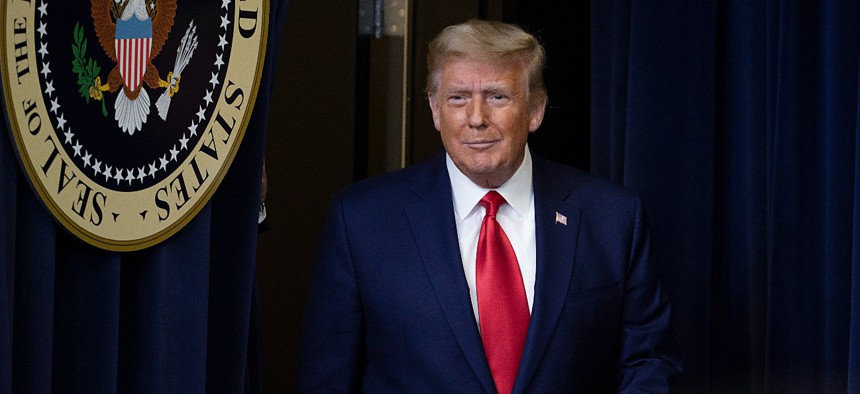
Tasos Katopodis/Getty Images file photo
The Trump White House Altered Early Pandemic Guidance and Muzzled Career Scientists, Documents Show
White House advisors said CDC's guidance on religious services was "problematic" and "offensive."
White House and other Trump administration officials interfered with public health agencies as they sought to advise and speak directly to the public in the opening months of the COVID-19 pandemic, including with efforts to protect Americans attending religious services, according to newly released documents.
The House Select Subcommittee on the Coronavirus Crisis on Friday released emails and interviews demonstrating the White House interfering with Centers for Disease Control and Prevention guidance on religious service attendance and blocking their employees from speaking publicly. CDC sent its proposed guidance to the White House in May 2020, including a recommendation that churches and other entities hold virtual services, but it immediately met resistance.
In an email circulated among White House officials on May 21, May Davis, its associate counsel, said the draft guidance was “problematic” and noted she proposed removing “tele-church suggestions” on top of other changes proposed by Counselor to the President Kellyanne Conway. The same day, Paul Ray, then administrator of the Office of Information and Regulatory Affairs at the White House, said CDC’s suggestions seemed to “raise religious liberty concerns.” He added if his colleagues approved, he would tell CDC they could publish the guidance “contingent on striking the offensive passages.”
Conway then thanked Ray for “holding firm against the newest round of mission creep.” CDC subsequently posted the guidance without mention of virtual services.
Democrats on the select committee noted CDC was at that time releasing reports of superspreader events taking place at churches across the country. The committee has uncovered 90 instances of political interference as career employees were responding to the pandemic, they said.
“These actions made our country sicker and did immense damage to our public health workforce and to public trust in our scientific institutions,” said panel chairman Rep. James Clyburn, D-S.C., at a hearing Friday morning.
The committee also released excerpts of an interview with former CDC Director Robert Redfield, in which he said it was one his “great disappointments” that his parent agency, the Health and Human Services Department, prevented him and his staff from holding press briefings. The gag order came after former CDC National Center for Immunization and Respiratory Diseases Director Nancy Messonnier told reporters in February 2020 it was not a matter of if but when a massive COVID-19 outbreak would occur.
“HHS is where I had to do it,” Redfield said. “You can ask them where they got their guidance. But my issue was HHS. They would not clear our briefings.” He added the muzzling of CDC negatively impacted the American public’s trust in the agency.
Clyburn said the Trump administration's actions led to career employees fearing retaliation from political appointees "simply for doing their jobs."
“When scientific reports did not align with their political message, Trump administration officials tried to alter their findings, delay their release or suppress them entirely,” Clyburn said. “Career scientists were blocked from speaking to the American public about the risks caused by the virus and how to mitigate its spread.”
In a report released earlier this month, the Government Accountability Office found CDC, the Food and Drug Administration and National Institutes of Health lacked sufficient scientific integrity policies. Employees at those agencies told GAO they experienced but did not report political interference because they feared retaliation or did not know how to do so. The Trump administration faced allegations of interfering with career scientists throughout its tenure, which spiked during the pandemic.
Anita Desikan, a senior analyst at the Union of Concerned Scientists who also testified at the hearing, noted that her organization found more than 200 instances of political interference in scientific work during the Trump administration.
“During the pandemic, we witnessed scientific integrity violations in which politics were elevated over science and agency decision making stepped far out of line from the best available science,” Desikan said. “Such actions risk the lives and safety of people, erode public trust in federal institutions, and undermine the legal framework governing the use of science in decision making.”
Republicans at the hearing dismissed the allegations as politically motivated attacks and said the Biden administration had interfered with decision making related to mask requirements and school reopenings. Since taking office, Biden has pledged to root out improper influence at scientific agencies and has created a task force that is working with every agency in government to strengthen their integrity policies.







